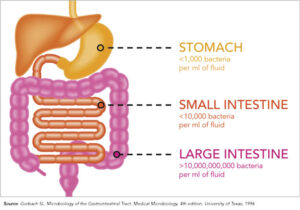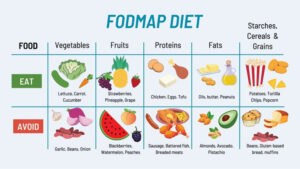Gut problems are an epidemic in our society. Often undiagnosed, these problems lead to loads of uncomfortable symptoms that mainstream medicine struggles to treat. My practice, however, specializes in uncovering the root cause of a person’s symptoms, so as to achieve the best of their health, naturally. One common gut problem is ‘SIBO’. This condition can wreak serious havoc on your gut and result in further health problems, if not addressed in time.
 So, what exactly is SIBO? ‘SIBO’ stands for ‘Small Intestinal Bacterial Overgrowth’. Your gut comprises small and large intestines. When you are not eating, all the gut bacteria migrate down into the large intestine, where they live. However, when this system gets disturbed due to various reasons, they migrate to the small intestine instead of the large intestine and start growing. These bacteria end up eating what you eat, fermenting the food in the wrong area, causing uncomfortable symptoms. SIBO is often considered a precursor to the more serious ‘leaky gut’, which is linked to many chronic and autoimmune conditions.
So, what exactly is SIBO? ‘SIBO’ stands for ‘Small Intestinal Bacterial Overgrowth’. Your gut comprises small and large intestines. When you are not eating, all the gut bacteria migrate down into the large intestine, where they live. However, when this system gets disturbed due to various reasons, they migrate to the small intestine instead of the large intestine and start growing. These bacteria end up eating what you eat, fermenting the food in the wrong area, causing uncomfortable symptoms. SIBO is often considered a precursor to the more serious ‘leaky gut’, which is linked to many chronic and autoimmune conditions.
Symptoms Experienced Due To SIBO
SIBO is associated with gut-related symptoms that are annoying but often considered ‘normal’ at first glance by mainstream medicine, since these are quite common, like: Constipation, Diarrhoea, Abdominal cramps, Flatulence/Gas, Nausea, Bloating, Acid Reflux, heartburn. If left unattended for a longer period of time SIBO can also lead to Irritable Bowel Syndrome (IBS).
What Causes SIBO?
SIBO can have both – direct causes or be influenced by other activities taking place in your body. Certain conditions have been linked to a predisposition for SIBO including: Pancreatitis (inflammation of the pancreas); Diabetes; Abdominal surgery; Celiac disease (hypersensitivity to gluten); Rosacea (skin condition); and even Ageing has also been known to contribute to SIBO since your digestive tract slows down with age.
 Consequences Of SIBO:
Consequences Of SIBO:
Other than uncomfortable symptoms, one of the biggest concerns of SIBO is malnutrition. SIBO inhibits the absorption of vitamins, fat, carbohydrates, and protein from foods, causing nutrient deficiency which is often a major problem for those with SIBO. Some common deficiencies that come up in the blood work for SIBO patients include iron, calcium, vitamin D, vitamin A, and vitamin B12. Since these nutrients can contribute to fatigue, weakness, brain fog, hormonal imbalance and low immunity, it’s vital to treat SIBO to overcome these nutrient deficiencies and improve your overall gut health.
Some Treatments To Help Overcome SIBO:
Identify The Root Cause: To treat SIBO and achieve long-term, sustainable healing, the first step is to identify its root cause in the first place and remedy that, so it ultimately doesn’t return. Working with a practitioner who can understand gut health is crucial in this case.
Opt For A Low FODMAP Diet: FODMAP (Fermentable Oligosaccharides, Disaccharides, Monosaccharides And Polyols) diet comprises eliminating specific carbohydrates /sugars that may cause intestinal distress, as these feed gut bacteria and encourage them to proliferate. Some foods that are high in FODMAPS are onions, cabbage, beans, apples, and rye which must be avoided till the issue resolves completely.
Add Probiotics To Your Routine: You can incorporate more probiotic-rich foods into your diet such as sauerkraut, kimchi, yoghourt, kefir, and Kombucha. Speak to your practitioner and add a supplement with a strain that works for you. Avoid probiotics that contain prebiotics, which can feed the bacterial overgrowth.
Practice Intermittent Fasting: An intermittent fasting protocol, where one limits food intake for a short period of time, to starve out the bacterial overgrowth, can be an effective against SIBO. Constantly eating also doesn’t give your gut a break! (Note: Practice this only under supervision of a professional specialist).
Add Supplements After Fixing Your Basic Lifestyle For An Overall Boost: In addition to probiotics that can be used to support a healthy microbiome environment, other supplements which help correct nutrient deficiencies caused by SIBO-induced malabsorption include: Vitamin B12, Vitamin D, Iron and Zinc.
The dosage will differ based on your age, gender, medical condition and physical state. Please get in touch with your healthcare practitioner to understand the same. In the end, the most important thing you can do when it comes to dealing with SIBO is to start with uncovering the root cause and coming up with a plan to facilitate healing. Incorporating some of these helpful healing tools will help you overcome SIBO and nurture a healthy gut!
- Healing or Harmful? - 15 March2025
- The Parsi Woman’s Guide To Superfoods For Hormonal Health - 8 March2025
- Strengthen Your Constitution This Republic Day! - 25 January2025
